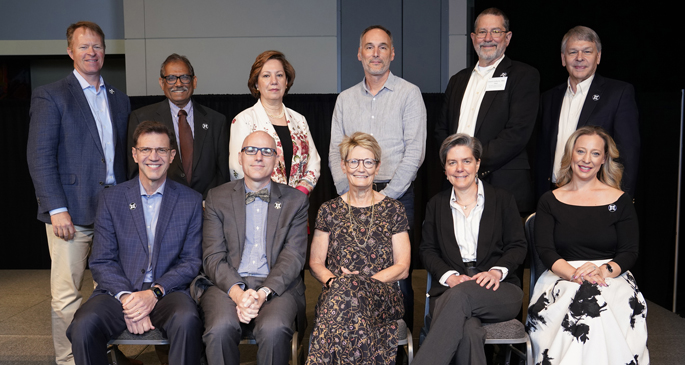
Speakers at the Vanderbilt-Ingram Cancer Center (VICC) 23rd Annual Scientific Retreat celebrated “Advances in Lung Cancer Research” but noted that too many people with the disease are not benefiting from those achievements.
“Lung cancer is our leading cause of cancer mortality. Twenty-nine percent of our total cancers are lung cancer. That’s the work we are going to talk about today, and it is incredibly important. In fact, one can argue that it is the onus and the responsibility of this cancer center, which sits in the belt buckle of lung cancer mortality, to really take this on in trials and research,” said VICC director Jennifer Pietenpol, PhD, Benjamin F. Byrd Professor of Oncology, Chief Scientific and Strategy Officer for Vanderbilt University Medical Center and holder of the Brock Family Directorship in Career Development.
The retreat was held in honor of Pierre Massion, MD, an internationally known expert on early detection and prevention strategies for lung cancer, who died in April 2021. He was director of the Cancer Early Detection and Prevention initiative and co-leader of the Cancer Health Outcomes and Control Research Program at VICC. Massion was one of the researchers who pioneered studies that led to the adoption of low-dose CT scans for early detection of lung cancer. Kathy Leiser’s cancer was discovered in 2011 when she participated in a clinical trial he led.
“He was an extraordinary physician and researcher, but I think what made him extraordinary was that whatever he was involved in, he never lost sight of his focus — and his focus was to help people,” Leiser said. “I think he chose medicine and research as a way to express his love of humanity. He cared genuinely about all of us.”
Despite the U.S. Preventive Services Task Force recommending CT scans in 2013 for people at high risk for lung cancer and then expanding those recommendations in 2021, the percentage of people who qualify for the scans and actually follow through remains low. M. Patricia Rivera, MD, associate director of Diversity, Equity and Inclusion at the University of Rochester Medical Center Wilmot Cancer Center, noted that only 5% of people eligible for the lung screens in 2018 followed through .
“It is the leading cause of cancer deaths in both men and women in the United States and in many parts of the world because the majority of the patients who are diagnosed with lung cancer are diagnosed at advanced stages of disease when we have much less chance of curing patients,” Rivera said.
Denise Aberle, PhD, professor of Radiology at the UCLA Jonsson Comprehensive Cancer Center, spoke about “Neural Networks: Human and Machine” and the role of artificial intelligence in diagnostic imaging for lung cancer. “Artificial intelligence will not replace radiologists,” she said. “However, radiologists who use AI will replace those of us who don’t.”
Julien Sage, PhD, with Stanford Cancer Center spoke about the “Molecular and Cellular Mechanisms of Small-Cell Lung Cancer initiation and Progression.”
Jill Feldman, a lung cancer survivor, reminded the room of researchers to always put people first in their work and to listen to and engage with patient advocates.
“You all are the experts, but we have our PhDs of cancer — persons with history of disease,” Feldman said. “We are experts in the lived experience, which is needed to ensure that research and its results are relevant and meaningful for patients.”
The Scientific Retreat returned as a live event this year with 111 poster presentations, which provided younger researchers the opportunity to showcase their work.
Ben Brown was named 2022 graduate student of the year for his research publications on EGFR-mutant lung cancer and HER2-mutant breast cancer, which have immediate clinical implications in terms of drug selection.
Kavi Mehta, PhD, was named 2022 postdoctoral fellow of the year for his investigations into the pathways that act to tolerate DNA damage during DNA replication.












